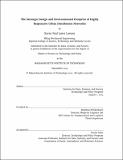The strategic design and environmental footprint of highly responsive urban distribution networks
Author(s)
Lavenir, Xavier Paul Lister.
Download1196239162-MIT.pdf (14.11Mb)
Other Contributors
Massachusetts Institute of Technology. Institute for Data, Systems, and Society.
Technology and Policy Program.
Advisor
Matthias Winkenbach.
Terms of use
Metadata
Show full item recordAbstract
With the rise of the on-demand economy and the increasingly high service levels expected by consumers, companies are racing to provide shorter and shorter delivery lead times for e-commerce orders. Two-day deliveries have become the norm in dense urban areas and companies are developing highly responsive urban distribution networks capable of serving consumers in lead times as low as one hour. These changing consumer shopping habits are leading to more fragmented deliveries and increased urban freight activity as it becomes more difficult to consolidate orders. Increased urban freight activity is in-turn leading to more congestion, greenhouse gas emissions, and air pollution, harming city residents. In this work, we explore the strategic design of highly responsive urban distribution networks, promising lead times of under two hours, and investigate which operational and environmental parameters drive the deployment of different types of network designs. We explore how adding extra levels of network flexibility, with the ability to physically relocate fulfilment capacities throughout the day using mobile inventory locations, affects the commercial and environmental performance of a network. Furthermore, we evaluate the environmental footprint of these networks by measuring their contribution to congestion and CO₂ and NO[subscript x] emissions, and contrast these with the environmental footprint of next-day delivery distribution networks. From a policy perspective, we investigate how the strategic design and performance of highly responsive networks are affected by an urban congestion charge policy and by different levels of government subsidy for last-mile logistics infrastructure. We optimize the design of these highly responsive networks using an iterative simulation-optimization approach which captures the stochastic and dynamic nature of the last-mile operations. We conduct a case study with a global fashion company, where we design highly responsive distribution networks capable of serving the company's online customers in Manhattan, New York, in under two hours. We find that highly responsive orders tend to be much less sustainable than orders delivered the next-day, with a higher delivery cost and environmental footprint. However, highly responsive networks can be sustainable if designed under favourable operational conditions, such as enabling the consolidation of orders and using sustainable couriers such as bicycles.
Description
This electronic version was submitted by the student author. The certified thesis is available in the Institute Archives and Special Collections. Thesis: S.M. in Technology and Policy, Massachusetts Institute of Technology, School of Engineering, Institute for Data, Systems, and Society, 2019 Cataloged from student-submitted PDF of thesis. Includes bibliographical references (pages 103-107).
Date issued
2019Department
Massachusetts Institute of Technology. Institute for Data, Systems, and Society; Technology and Policy Program; Massachusetts Institute of Technology. Engineering Systems DivisionPublisher
Massachusetts Institute of Technology
Keywords
Institute for Data, Systems, and Society., Technology and Policy Program.